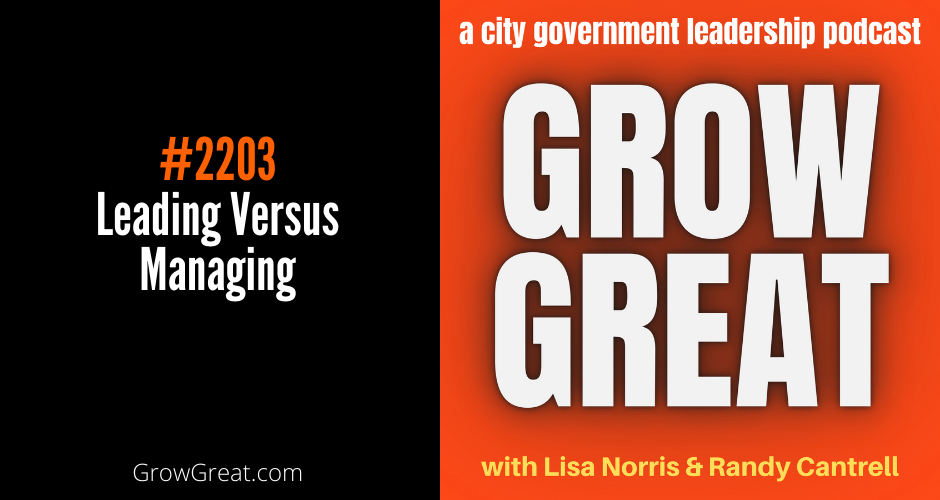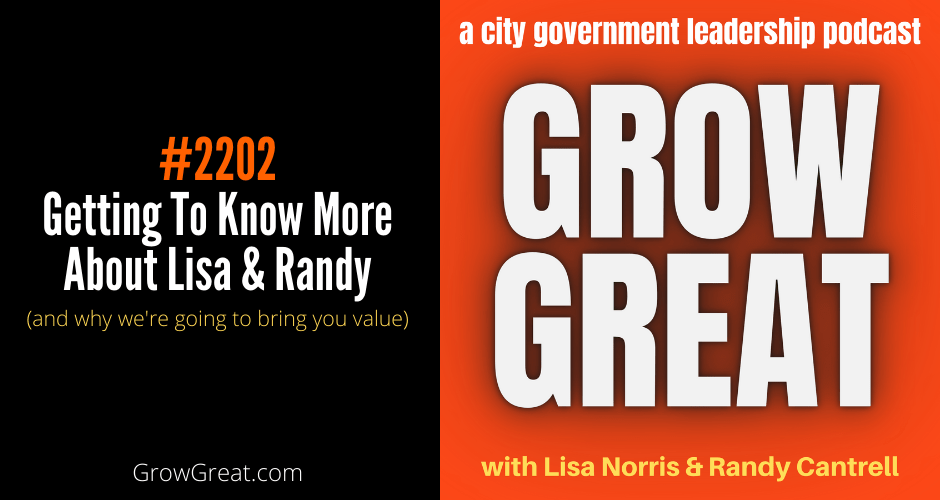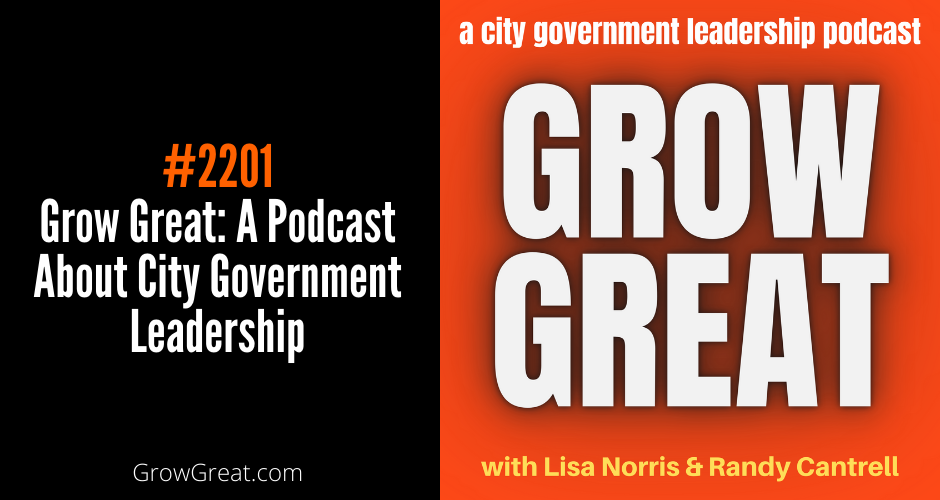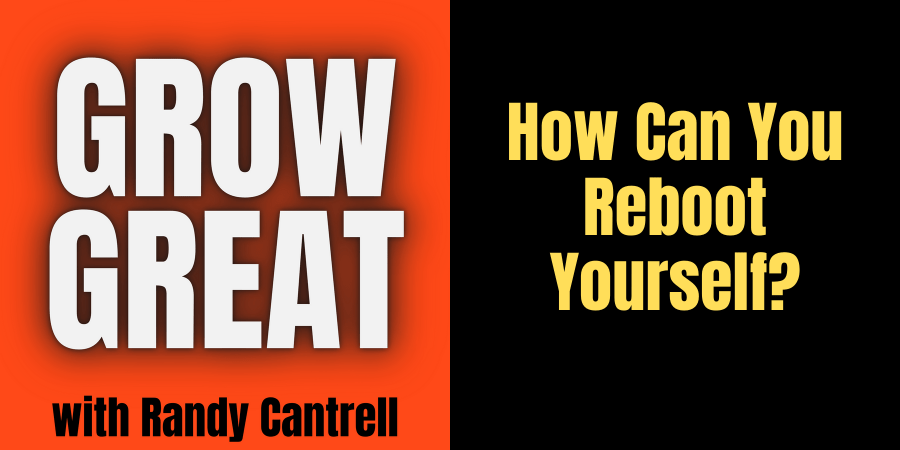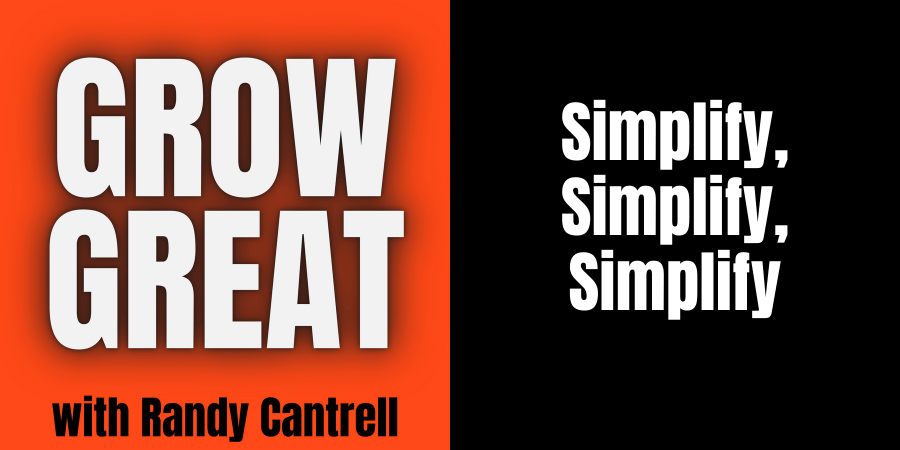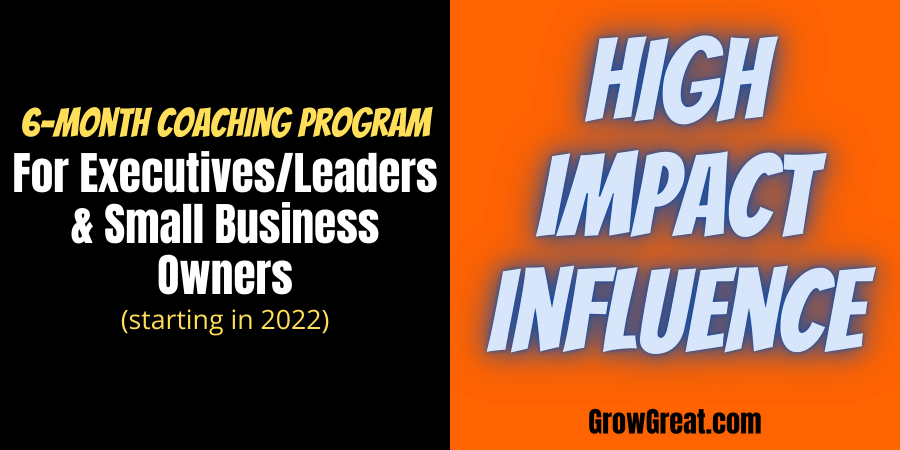Podcast: Play in new window | Download (Duration: 22:47 — 20.9MB)
Subscribe: Apple Podcasts | Spotify | | More
Thank you for clicking play on the Grow Great podcast.
Warning – some sports analogies ahead! 😉
I’m an OU Sooner football fan, the hazards of being born in Oklahoma. Sooner fans were shocked over a month ago when head coach, Lincoln Riley, resigned to take his talents to USC. Within weeks a new head coach was hired, a previous defensive coach for OU whose been in Clemson for the past decade. It was a homecoming for coach Venables and for fans. Within a week or two of his hiring the entire OU football program was completely restructured from top to bottom. The whole thing looked completely different within 30 days or so! It was amazing to watch the OU brain trust reboot themselves – and reinvent what was already a successful program.
Most OU fans – my hands are in the air – quickly became more excited about the program than we’ve been in a very long time. We went from disbelief that our coach left us for USC to elation over the changes and improvements in coaches, staff and even players! It’s been remarkable and over time I suspect there’ll be many lessons organizations and leaders can learn from such shifts in direction. It truly has been a lesson in how to make lemonade out of lemons. To go from an unexpected resignation to vast improvement.
I regularly ask leaders to consider the hypothetical of losing their top right-hand person. Most don’t want to think about it. But it happens. Would you be able to do what the president and athletic director of OU did? If you’re prepared, bold and able to quickly gather information to deepen your understanding you can.
On Sunday the Dallas Cowboys disappointed their fans…again. A team that can’t seem to ever get out of their own way, the Cowboys lost their first playoff game of the season – something that seems to be an annual habit, assuming they even make it into the playoffs. Fans worldwide are wondering when and if anything will change. It doesn’t seem it will because Jerry Jones, the owner, continues to keep the coaching staff and other insiders littered with remnants of the past. Since he bought the team and cleaned house, I’m not sure it’s ever happened since. And the results haven’t been great for over 20 years.
Sunday’s game resulted in some coaching decisions that national and local pundits are claiming should cost the head coach his job. But ownership has expressed high confidence in the coach indicating they have no designs on making a change, an improvement. It begs the question, “Can or will the head coach reboot himself in the off-season and do a better job next season?” Time will tell. If you’re a betting person, I’d suggest you keep your money in your pocket though.
Can you reboot yourself? If so, how?
First of all, of course, you can. Anybody can. Rather than shuffling past that, maybe we ought to spend more time on that point. I’m fascinated by the number of top-level leaders who subscribe to the philosophy that “we are what we are.” Pressed about our ability to change, I mostly hear, “Well, sure people can change but mostly they don’t.” I admit that I endure bouts of being blue – melancholy – especially after over-exposure to pessimistic people. It’s depressing to hear leaders talk about a direct report as though there’s no influence on the planet capable of helping them grow and improve. It goes against everything this podcast is about – change, transformation, growth, and improvement! But I’ve learned there are many, many leaders who feel that way about people on their team.
Experience has taught me to better understand it though.
Mostly, we’re surrounded by people – and we have been surrounded by people – who are what they are. We’ve not seen people make big changes in their life. And when people recite examples where people have done it, they’re usually stories of redemption from destructive behavior. A drug addict who got clean. An alcoholic who has been sober for 20 years. A convict who was released and made something of their life. When is the last time you heard a story about growth and improvement – a story about somebody performing at some level who found a way to elevate their performance? We don’t hear those stories. Does it mean they’re not happening? Turns out I think a lot of people assume they don’t happen.
I define leadership simply as a focus on others coupled with the ability to do for others what they can’t do for themselves.
Largely, this means leaders have high impact influence (which is why I once used that as the moniker for this podcast). It’s shocking to sit with a leader who simply doesn’t believe she has that level of influence to help people grow and improve. But I honestly think it’s simply because we’re all a bit jaded. And while each of us can do whatever we want, it doesn’t mean we lack the power to help and influence one another to become better!
When asked about my coaching process I usually answer simply. “I help people paint themselves into a corner so they can look in the mirror and begin to figure out what they need to do to grow and improve.” More than half the time people aren’t carefully listening though and they’ll follow up their question with, “You paint people in a corner?” So I have to clarify and repeat my statement, “No, I help people paint THEMSELVES into a corner because that’s where the magic of growth happens – when we no longer have any excuses. We all do what we want. My clients always do the heavy lifting to improve their lives.”
That’s why I’ve posed today’s questions as I have.
Can you reboot yourself?
How can you reboot yourself?
Yes, others can help. Like the leaders I’ve talked about. Trusted advisors can help. Peers can help. Professionals can help. But the saying is absolutely true…”If it is to be, it’s up to ME.”
I hope you’re fully convinced you can reboot yourself – even if rebooting means making some necessary, but incremental improvement. I’m also hopeful that as a leader you’re convinced you have a role to play in serving the people on your team. Their performance can be enhanced by your willingness, ability and determination to help them grow and improve. No, you can’t do it for them, but you can give them the best opportunities to figure it out for themselves. And if you’re the boss, then you also have the power of authority, which means you can leverage your influence even further for their good.
But how can we do this for ourselves?
First, a big dose of reality – you can’t do it for yourself if you don’t want to, or if you don’t see any need.
There is a remarkable truth about high performers…they’re always looking intently for ways to gain an edge, to find ways to improve. They pursue growth all the time. High performers tend to avoid complacency. And when they do find themselves leaning toward it, they work to get themselves out of it. Their mantra is universal and consistent – keep moving forward!
Conversely, those who have yet to figure that out suffer a myriad of excuses and feeling like victims. Their conversations are peppered with “if only” or phrases meaning the same thing. I’m sure many of them fully believe their statements are true. The universe is imposing on them whatever failures or challenges they suffer. I can’t claim a high degree of success in convincing people otherwise. And at this stage of my life – professionally and personally – I mostly don’t devote an extraordinary amount of time to the cause because I simply have found myself somewhat powerless to convince the unconvinced. More importantly, I choose to invest my time in helping high performers working hard to find an additional 2% improvement than in struggling to convince an average (or even below average performers) that so much more is possible.
But I’ll share what I’ve learned through the years.
Step 1: Find a way to see yourself with greater control over the outcomes of your life.
I know it sounds ridiculously simple, but it’s not easy for those who don’t yet believe it. Make up your mind that you’re going to accept responsibility for what happens. It doesn’t mean everything is your fault. It simply means you don’t have power over anybody except yourself. So forget what others are doing – or failing to do. Get busy doing what you can to improve your life. Nobody is going to devote themselves to improving your life as much as you’re able. And there’s no downside to accepting responsibility for your life. It empowers you to do more. It removes any tendencies to feel like you’re a victim. Again, this isn’t about playing the blame game. Forget about who is to blame. Just accept responsibility for your life and move forward no matter what.
Step 2: Surround yourself with safe people.
Safe people are those people you can rely on. They’re people who won’t use your weaknesses or failures against you. Rather, they’re happy, willing and able to help you through them by helping you figure out what to do next. They’re not quick to judge, criticize or tell you what you ought to do!
A side component to this is to rid yourself of unsafe people. Surrounding yourself with safe people won’t help if you continue to linger around unsafe people. Jettison them. Get them out of your life completely. These people don’t help you. They’re harmful and destructive. They’ll weaken you if you let them. Don’t.
Step 3: Listen and watch so you can understand reality.
These safe folks can help you look more closely in the mirror. In order to figure out where you need to go…you must first understand where you are. Facing reality is one of the hardest jobs for anybody. Especially the reality of our performance (that includes how we think, talk, behave and make decisions). When the boss tells us we need to grow or improve in a certain area we can resent them and the information or we can accept it and do our best to lean into helping ourselves get better. It doesn’t mean we have to agree with them fully. But it means we look for as much acceptance as possible by declaring ourselves responsible for the outcomes of our own life. We have to acknowledge that the viewpoint through our own eyes may differ from how others see us. Let’s leverage the viewpoints so we can more accurately see ourselves.
Step 4: Make up your own mind and figure it out.
Gather the insights from the safe people. Look inside yourself. Think deeply about who and what you are. Make your own conclusions. Figure out the very next step. Remember, this is your life and you’re responsible. Just because you’re listening and watching what others (who are safe) are telling you doesn’t mean you’re surrendering your life to them. For starters, they don’t want and will refuse that responsibility. They’ve got their own lives. Additionally, safe people who are capable of helping us will not impose or influence us toward anything that’s bad or harmful for us. By being safe they’re naturally most interested in helping us become better. Even so, it’s up to us to put in the work.
Step 5: Take the first step then keep working to figure out “now what?”
I know we want to know every step of the process, but nobody ever does. So what if you don’t know step 2 or 27? You just need to know the very next step, step 1. Then repeat the process. So often we get stuck refusing to take the first step because we don’t know what step 4 is. Who cares? And besides, by the time we get there, whatever we thought step 4 would be is likely to be very different. There’s power in taking the first step and figuring it out from there. Life is all about taking actions and making adjustments. Commit yourself to become an expert at both.
Step 6: Keep it going. Don’t stop. Ever. No matter what.
Talk to any high performer and you’ll quickly see a person committed to lifelong learning and improvement. Join their ranks.
Years ago Nike launched a Michael Jordan campaign, “Be like Mike.” Well, when it comes to your commitment to your own growth and improvement, then “be like Mike.”
Be well. Do good. Grow great!



